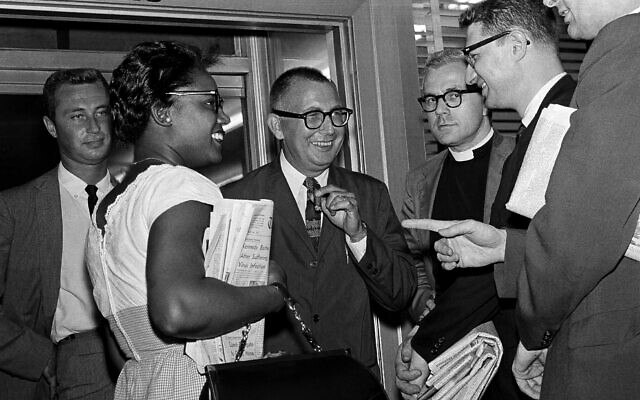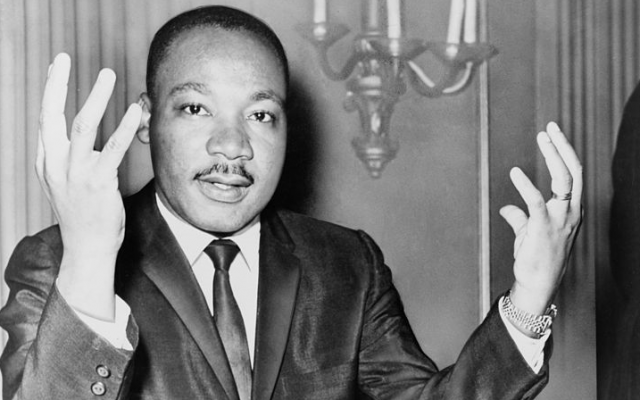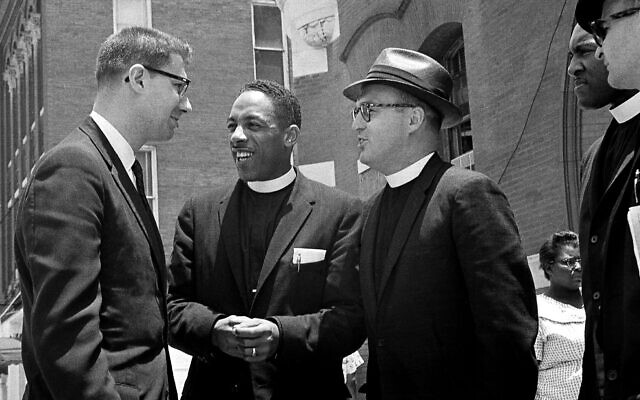Reform Rabbi Israel S. "Sy" Dresner, a/k/a/ "the most arrested Rabbi" died on January 14, 2021. Rabbi Dresner went to jail four times during 1961-64 in then-segregated Florida and Georgia. His illegal arrests were for praying in St. Augustine and for protesting in support of civil rights. He was a strong supporter of civil rights, including rights for Lesbian, Gay, Bisexual and Transgender people. He was an avid advocate of peace, from the days of the Vietnam War to Jewish settlements on the West Bank. His obituary was on NPR on January 15, 2021.
I was honored to meet, talk and dine with the late great reform Rabbi Israel "Sy" Dresner on June 18, 2014 at St. Paul A.M.E. Church in Lincolnville, here in St. Augustine, Florida.
It was the 50th anniversary of the "most arrested" Rabbi, Israel "Sy" Dresner's 1964 arrest for praying for civil rights, we shared a meal with community members.
Cooked by the beloved church member Ms. Cora Tyson, who cooked for Dr. King when he was here in in St. Augustine, we enjoyed dining and socializing in St. Paul A.M.E. basement. We ate Rev. Dr. King's favorite meal, with a few Jewish dietary modifications.
Our meal at St. Paul A.M.E.was shared with six of the sixteen arrested reform Rabbis visiting St. Augustine in 2014, the 50th anniversary of their arrest.
I was honored to dine at the same table with Rabbi Israel "Sy" Dresner, the "most arrested Rabbi," and Rabbi Allen Secher, two of the 16 arrested Rabbis.
On the day that Dr. King was arrested (June 11, 1965) for seeking to eat at Monson Motler Lodge, Dr. King sent a telegram to his friend, Rabbi Dresner, who was attending a reform Rabbi convention in Atlantic City. One week later, on June 18, 1964. sixteen Rabbis and one administrator were arrested for praying at Monson Motor Lodge. Fifty years later, they returned, speaking at local fora and sharing a meal at St. Paul A.M.E, where civil rights leaders spoke often, including baseball great Jackie Robinson, Rev. Andrew Young (later UN Ambassador and Congressman), and Dr. King himself.
Corrupt KKK Sheriff Lawrence O. Davis and corrupt St. Augustine Police Chief Virgil Stuart share blame for 1000 arrests, which were removed to federal court by lawyers led by William Kuntsler and dismissed by United States District Court Judge Bryan Simpson, for whom the Jacksonville federal courthouse is now named.
At our June 18, 2014 lunch in the A.M.E. basement, I asked Rabbi Dresner and Rabbi Secher about the little baskets with containers of baby food and crackers on each of the fellowship hall tables.
The two Rabbis recounted how the St. Johns County Jail proved nutrition. I ask why baby food, and we had a colloquy.
Near as we could figure, it was Sheriff Davis's way of preventing the Rabbis from being served poison or ground glass -- L.O. Davis knew his deputies were KKK members, a fact that was irrefragable, and found in federal court orders by Judge Bryan Simpson!
Footnote: to this day, the unenlightened St. Johns County Sheriff's office still has a website with false and misleading information about Sheriff Davis, falsely stating that he was exonerated by the State Senate that voted 44-2 to remove him for bribery and corruption.
From NPR:
Remembering Rabbi Israel Dresner, a Freedom Rider in the civil rights movement
One of the original Freedom Riders has died. Rabbi Israel Dresner was arrested and jailed multiple times for his activism. He was among those who answered Martin Luther King Jr.'s call.
From Times of Israel:
OBITUARY
Israel ‘Sy’ Dresner, ‘most arrested rabbi,’ who marched with MLK Jr., dies at 92
‘Freedom rider,’ who built a career as a social justice-oriented rabbi, recently said he wanted to be remembered in part for invoking doctrine of ‘tikkun olam,’ repairing the world
By SHIRA HANAU
Today, 12:25 am
JTA — Rabbi Israel “Sy” Dresner, who demonstrated with Martin Luther King Jr. and was sometimes called the “most arrested rabbi in America,” died Thursday at age 92.
Dresner, who was a Freedom Rider in the 1960s, built a career as a social justice-oriented Reform rabbi who was active in the fight against the Vietnam War and was a vocal opponent of Israel’s military control of the West Bank. Dresner was diagnosed with stage 4 colon cancer in December.
“Well, I want to be remembered as somebody who not only tried to keep the Jewish faith … But also to invoke the Jewish doctrine from the Talmud, which is called ‘tikkun olam,’ repairing the world, and I hope that I made a little bit of a contribution to making the world a little better place,” Dresner told CBS New York in December.
Israel Seymour Dresner was born on the Lower East Side in 1929 to an Orthodox family and grew up in Brooklyn, where his father ran a delicatessen. He attended yeshivas as a child but went on to become a Reform rabbi after serving in the Korean War and working on a kibbutz in Israel.
He first practiced his activism protesting the British government’s decision to block Jewish immigration to Palestine outside a British-owned business in Manhattan in 1947, according to a 2011 interview with the New York Jewish Week.
His first arrest came in June 1961, when an interfaith group of white and Black activists traveled on a bus through the South on a Freedom Ride that aimed to desegregate bus stations. He was arrested again every summer over the next three years.
“I was a Reform rabbi, but I always wore a yarmulke,” Dresner told the Jewish Telegraphic Agency in 2011, 50 years after his first Freedom Ride. “I wanted people to know I was Jewish.”

Dresner first met King in 1962. That summer, he spent a night trapped in a house with King and other activists while the house was surrounded by hundreds of members of the local White Citizens Council. King told Dresner about his experience attending a Passover seder at a Reform synagogue in Atlanta that year.
“Dr. King said to me, ‘I was enormously impressed that 3,000 years later, these people remember their ancestors were slaves, and they’re not ashamed,” Dresner said. “He told me, ‘We Negroes have to learn that, not to be ashamed of our slave heritage.’”
In 1963, King spoke at Dresner’s synagogue in Springfield, New Jersey. In 1964, at King’s request, Dresner led a delegation of Reform rabbis to St. Augustine, Florida, where they participated in an anti-segregation protest at the Monson Motor Lodge.
“We need you down here with as many Rabbis as you can bring with you!” King wrote to Dresner. Dresner and the other rabbis traveled to Florida straight from a meeting of the Central Conference of Rabbis meeting in Atlantic City, New Jersey.
In 1965, King asked Dresner to deliver the prayer at the Edmund Pettus Bridge in Selma, Alabama.

Dresner’s activism extended far beyond the Civil Rights Movement. In the 1970s, Dresner frequently protested in support of Soviet Jews. In 1982, he unsuccessfully tried to get the Central Conference of American Rabbis to condemn Israel’s invasion of Lebanon. At the time, Dresner told JTA he was committed to a “democratic and just Israel” and “what is happening in Lebanon today has nothing to do with that kind of Israel.” In 2013, Dresner was honored by President Barack Obama for his role in the Civil Rights Movement.
On Dresner’s bucket list after receiving his cancer diagnosis was a trip to Katz’s deli on the Lower East Side for one last pastrami sandwich. “He didn’t ask a single question about the disease. He was ready — and ready to fill whatever weeks he had left, as he had filled the nine decades before,” his son, Avi Dresner, wrote in an essay for the Forward.
Speaking to JTA in 2011 about his work in the Civil Rights movement, Dresner said he would do it all over again if the moment called for it.“Because I’m Jewish,” Dresner said. “I didn’t see any alternative.”

No comments:
Post a Comment